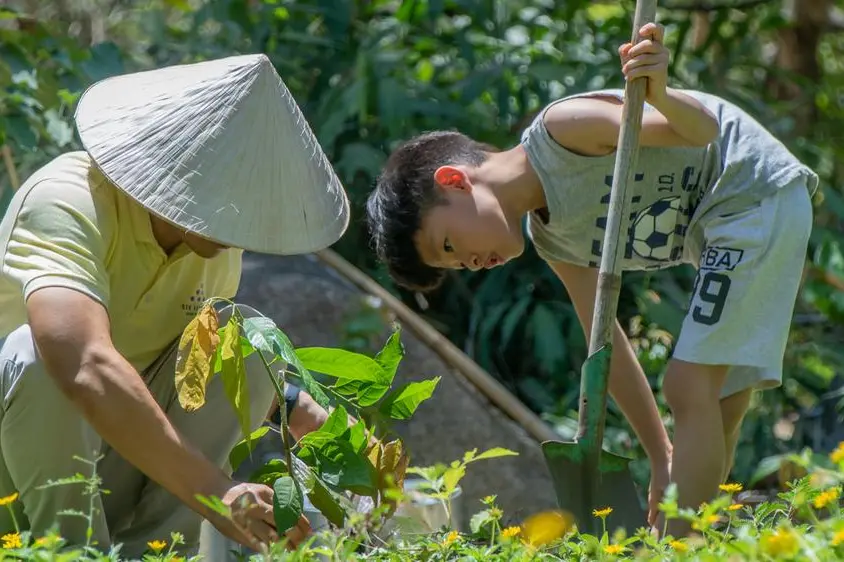PHOTO
UAE:
Walking the walk
The figures are based on energy and water consumption, habitat and endangered species protection and restoration, and vital community and cultural heritage projects. With numbers crunched, they clearly show that the brand doesn’t just talk the talk; it walks the walk when it comes to making a real and tangible difference.
Six Senses is leading the hospitality industry by using dedicated funds at each property to provide investment in projects that benefit local communities and environments while guest bookings contribute directly to each resort’s Sustainability Fund.
Commenting on the 2022 results, Vice President of Sustainability Jeff Smith said, “We are incredibly proud of the achievements being made by our NGO and community partners on the ground. Each resort has taken on unique projects based on the local need and is aiming for the greatest measurable impact at that destination. And I welcome all our guests to join us in celebrating these projects and partnerships, which are only made possible by guest visits and ongoing support.”
Sustainability wins in 2022
Protecting species and habitats on land and at sea
At sea, projects of note include creating a protected nest area for endangered green sea turtles at Six Senses Con Dao in Vietnam, that resulted in 6,929 hatchlings making their way to the ocean. Six Senses Laamu continues to protect 115,000 square meters of seagrass meadows (16 soccer fields!) in the Maldives, allowing fish, rays, sharks, and green sea turtles — all vital for the delicate ecosystem — to thrive.
The activity continues on shore, with 153 critically endangered langur monkeys now VIP residents at Six Senses Ninh Van Bay in Vietnam, welcoming 42 new babies to their groups in 2022. Over at Six Senses Ibiza, 600 injured hedgehogs on the island were rescued and cared for, where in Europe, populations are in rapid decline. And in Portugal, Six Senses Douro Valley works with a donkey sanctuary who assessed 429 rare Mirandas for welfare, rescuing 14 for extra care.
Group-wide, Six Senses preserved or restored 23,391 square meters of habitat while seven endangered and four more critically endangered species were protected and conserved.
Celebrating cultural heritage
Six Senses Zighy Bay in Oman continues to support and empower local women via the Dibba Women Association while enabling guests to experience the unique culture and traditions they nurture and celebrate. The proceeds from their entrepreneurial business endeavors help fund infrastructure development projects, including facilities for local children.
For its first major sustainability project, the recently opened Six Senses Rome sensitively renovated the magnificent façade of the adjacent San Marcello al Corso Church. They uncovered an important fourth-century baptismal bath in the basement, which can be seen through a glass floor next to the Earth Lab.
Knowledge is solar power
The first in-resort solarized farm in Vietnam provides electricity, organic veg, and hot water to Six Senses Ninh Van Bay and their organic garden Solar FreshCuts is planted beneath 800 solar panels, which are sited to provide just the right amount of sun and shade.
Six Senses Ibiza produces its own reusable energy, saving 40 percent of the resort’s carbon emissions while 10 Olympic sized swimming pools of water were saved in 2022.
Every tree counts
Since its beginnings, Six Senses has been a fan of trees, recognizing their importance to wildlife and humans, with several thousand planted (and several more hugged) each year. At Six Senses Ninh Van Bay in Vietnam, for example, young guests are invited to plant a tree at the fruit farm as part of the resort’s Grow With Six Senses initiative, which harnesses the power of play to teach children how to care for the planet.
At Six Senses Fiji, 7,881 square meters of habitat were restored by planting native plants, including 600 mangrove samplings as part of a project to expand the local mangrove forest, providing shelter to marine life, and protection to the shoreline.
Plastic Freedom
Six Senses committed to the intentionally over-ambitious goal of eliminating plastic from its hotel and spa operations by end-2022, going beyond single-use plastic and packaging and researching every plastic-free possibility (from computers to plug sockets – all innovative ideas welcome).
The journey began by bottling drinking water (still and sparkling) in reusable glass bottles, saving 1.7 million plastic bottles from circulation in 2022. Other initiatives include toothpaste made from homegrown aloe vera, homes for hens constructed from bamboo and vines, and natural packaging solutions in kitchens, bathrooms, and from suppliers. Six Senses continues to innovate in the fight against single-use and virgin plastics, kickstarting new and creative solutions, one day, one guest, one story at a time.
Earth Lab
Each Six Senses property features an Earth Lab, dedicated to engagement and innovation, promoting sustainable living in inspirational ways. The space is used to host workshops that empower guests and community members to learn about and connect more closely with the natural world. Vice President of Sustainability Jeff Smith, invites guests to visit: “Guests at any Six Senses property can find out more by dropping into the Earth Lab or joining a sustainability tour.”
Through our Earth Labs, in 2022 we upcycled more than 5,000 kilograms of glass into new products, created more than 400 kilograms of tailor-made upcycled products with used fabrics and linens and made more than 4,300 candles with reused wax.
Brighter futures for communities
Community engagement continues every year at every resort, with Six Senses providing better access to education and skill training to 8,528 students, creating 113 jobs outside our hotels in local communities, and encouraging 9,590 community members to join positive impact initiatives in 2022 alone.
Hosts dedicated 4,900 hours to volunteering, 9,590 members of local communities joined various events, and 19,403 guests also got involved. The results speak for themselves: 33,9887 kilograms of trash collected from surrounding areas, 7,977 people with improved public waste management, 120,467 people with access to clean drinking water, and 17,545 people with improved access to medical care.




















